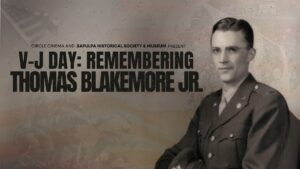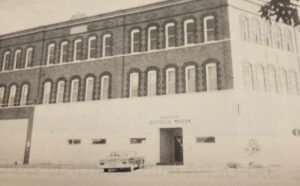Rachel Whitney, Curator, Sapulpa Historical Museum
What does the western band the Texas Playboys, the town of Sapulpa, and the song “Faded Love” have in common? Bob Wills.
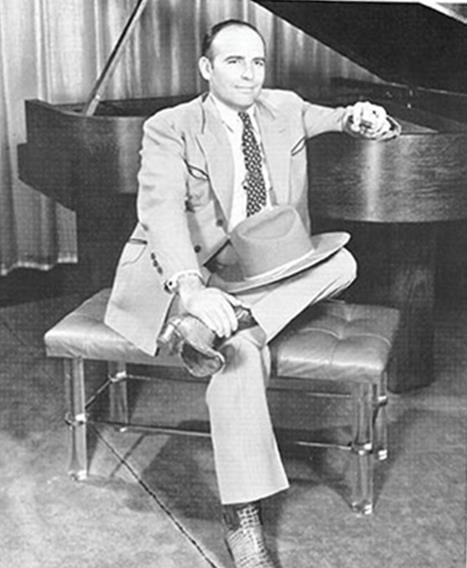
“Bob Wills shared an American art form known as Western swing. He was a visionary, fiddler, composer, bandleader, and showman. His impact was personal. People met and fell in love at his dances. They found refuge in his radio broadcasts. He was significant to their lives. In the moment that he began to reflect the times, he was an agent of changing times. Innovation and improvisation were his hallmarks. He was the son of a sharecropper who rose to fame; and people particularly during the Great Depression, found hope in his story. This boy from between the rivers who became Bob Wills, the great innovator and American treasure, is an important part of America’s musical and cultural roots.”
Born on March 6, 1905, James Robert “Jim Rob” Wills was born near Kosse, Texas. He and his eight siblings were born and raised by Emmaline Foley and John Tompkins Wills. A family with a musical heritage would soon play across the country, live on the radio and in person.
The family lived to play music, and Jim Bob’s papa was a hardworking fiddler. In 1913, Jim Bob played in front of a crowd, and his stardom began. “On a night when his papa arrived too late to fiddle at a ranch dance, a sharp-eyed, skinny, ten-year-old Jim Rob, fiddle-in-hand, played the first dance in a lifetime of dances.”
Jim Rob grew up with a passion for music and hard work. As he grew older, he wanted to use his talent for a career. However, the Great Depression hit the country and world hard, and people needed jobs. “During the Great Depression, in search of earnings, Jim Rob moved to Fort Worth, TX. He worked as a musician and black-faced comic in a medicine show and began to be called Bob. He and a former cast-member Herman Arnspiger found jobs at KTAT radio and played house parties as the Wills Fiddle Band, which soon grew to include his brothers Milton and Durwood Brown.”
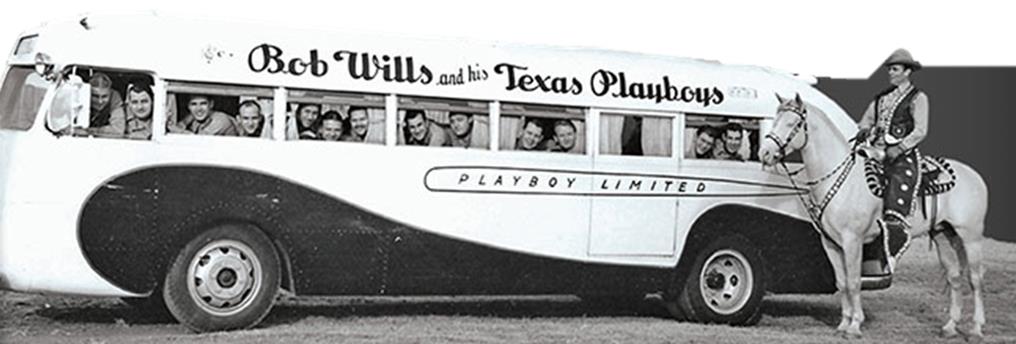
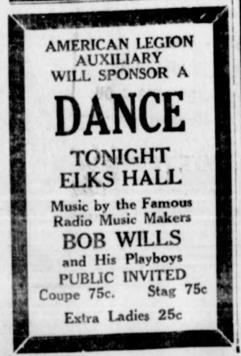
In 1926, he married Edna Posey, and they had a daughter in 1929 named Robbie Jo. And by 1933, they moved to Waco for Bob’s newest radio gig. Bob began doing a noon broadcast showings with his band. “Bob called the band ‘The Playboys.’ Original Playboys included Bob on fiddle; Tommy Duncan, piano and vocals; Kermit Whalin, steel guitar and bass; Johnnie Lee Wills, tenor banjo; and June Whalin, rhythm guitar.”
The following year, the crew left for Oklahoma. First in Oklahoma City, then in Tulsa, the band broadcasted their “popular dance tunes with jazzy improvisation.”
Bob and his band kept playing. In Oklahoma City, the “WKY station was the first station to bill Bob and his band ‘Bob Wills and his Texas Playboys.’ From 1934-1942, at 12:30pm, powerhouse station KVOO was home to Bob Wills and his Texas Playboys; their radio program a veritable institution to its listeners.”
“Bob and the band played six radio broadcasts per week, four nights on the road and two nights at Cain’s Dancing Academy. Their first performance at Cain’s was on New Year’s night 1935, which, then, led to regular Thursday and Saturday night dances including one hour of live broadcast. The noon broadcasts on KVOO began to originate from the historic Cain’s ballroom.”
Cain’s ballroom turns 100 this year, opening in 1924. Bob Wills began playing there during Cain’s 10th year anniversary, and his birthday is still celebrated each year. Bob Wills and his band has connections not only to Cain’s and Tulsa but with Sapulpa, as well.
Back in 1926, Harry and Grace Anderson gave birth to Betty Lou Anderson at Red Fork, Oklahoma. Betty’s parents moved to Sapulpa just a few short years later. During the 1930s, the Andersons owned the Elkhorn Cafe at 219 East Dewey Ave. Betty Lou grew up in Sapulpa, and would soon walk through the doors of the Sapulpa High School that stood on Dewey Ave.
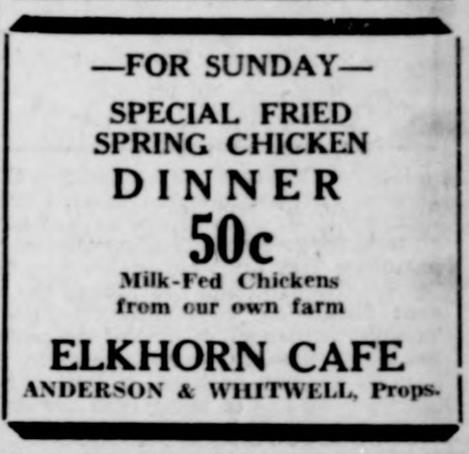
During her Freshman year of 1940-1941, Betty Lou Anderson joined the Sapulpa High School band. She became a drum major and majorette. She enjoyed live music and “often visited venues for music, specifically at Cain’s in Tulsa.”
“Beloved and successful in his public life, Bob struggled to find happiness at home. With women, he was known to be impulsive, moody, and jealous, and yet, marriage and family remained important to him.”
Before 1941, Bob Wills was married five times and divorced five times. Bob and Edna divorced in 1935. He married Ruth McMaster in 1936, and they were divorced shortly after in the same year. “He was twice married to, and twice divorced from Mary Helen Brown, the widow of Wills’ ex-band member Milton Brown, between 1938 and 1939.” He married Mary Louise Parker in 1939, and they had their daughter, Rosetta Wills. They were divorced soon after in 1939. “In 1941, he was single again.”
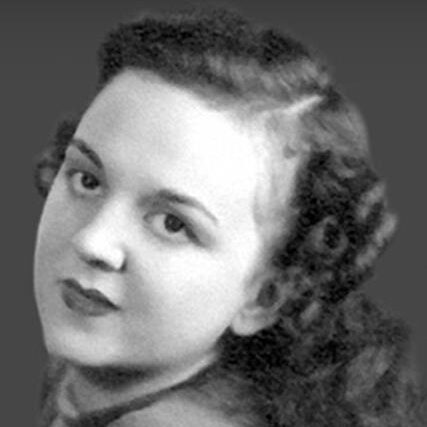
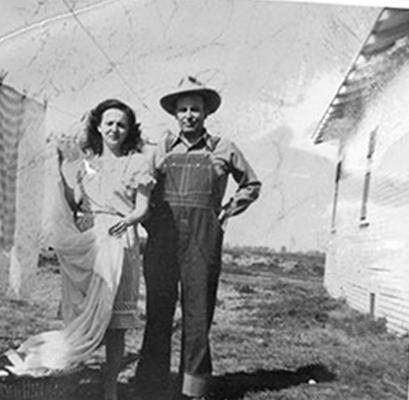
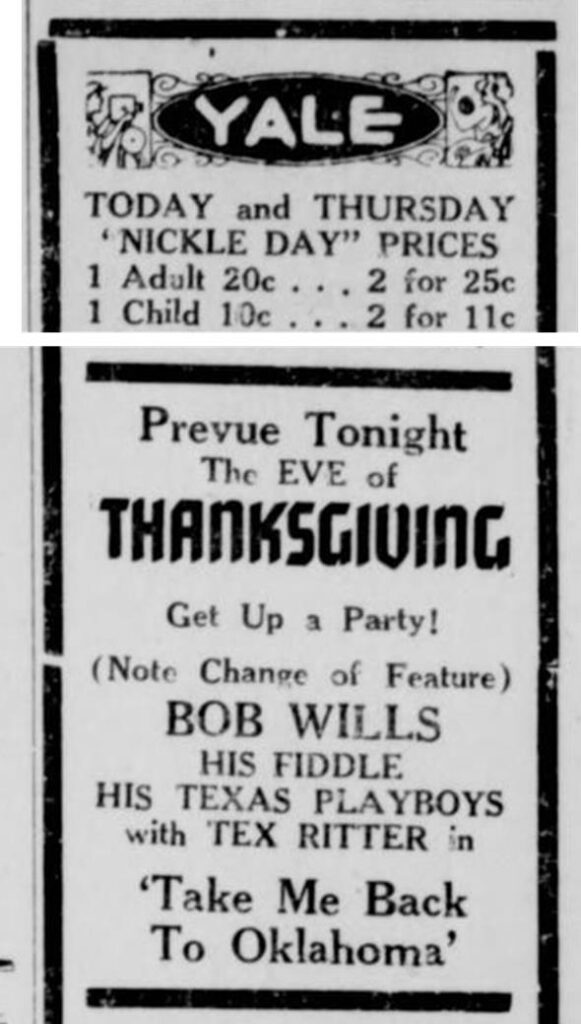
Bob Wills, Betty, and the Texas Playboys had many adventures. Through the 1940s, California called to them. “Bob appeared in his first ‘shoot-em-up’ movie, Take Me Back to Oklahoma with Tex Ritter in 1940. Working on a script might not have been his forte, but fans welcomed the chance to see him, and the movies reached new audiences. Go West Young Lady was made in 1941 featuring Bob Wills. From 1942 to 1945, Bob made a series of movies for Columbia Pictures.”
“One evening while playing a dance at Cain’s Academy, Bob met Betty Lou Anderson, of Sapulpa, OK. She was young and petite with curly black hair, big brown eyes, and an attitude of total possibility. At 37, he had matured into a heart-melting celebrity with a list of failed marriages. Their connection would carry them through ever-changing times, 33 years of marriage, and four children: James Robert II, Carolyn, Diane, and Cindy Wills.”
During this time, the world was at war. “In the midst of the Hollywood excitement, though, trouble brewed on the world stage. Bob was drafted by the Army three months shy of his 38th birthday (draft limit was 38). He reported for duty at Fort Sill, OK, a few days after Christmas 1942 and was stationed at Camp Howze near Gainesville, TX. By July 1943, it was agreed that his physical suitability paled to his value at helping to raise war bonds and he was discharged.”
In 1950, Bob and Betty moved to Dallas, TX. “Wills and the Texas Playboys recorded with several publishers and companies, including Vocalion, Okeh, Columbia, and MGM. In 1950, Wills had two top 10 hits, ‘Ida Red Likes the Boogie’ and ‘Faded Love.’”
Erdice Dale Amend had been in the Navy. Here, he met Leon McAuliffe, a Texas Playboys steel guitarist. Leon taught Erdice how to play the steel guitar while on their ship. Leon had noticed Erdice was good at it. Leon said if he got good enough, after their time in service, he would introduce him to Bob Wills.
After Erdice went back home, Erdice began taking steel guitar lessons near Paris, TX and made his way to Antlers, OK. He reached out to Leon, and met Bob Wills and his band. Bob Wills had Erdice play at Cain’s Ballroom on the “noon day broadcast.” He would not only play steel guitar, Erdice would also show off his vocal skills, too, and sing the band’s tunes. “When he was playing with Bob Wills, sometimes, Bob would turn to him and say ‘ah ha! Pete!’ And Bob called him Pete.”*
*Note: Erdice’s custom steel guitar case had “Bob Wills, Pete Amend: Swing on Strings” written across the front of the case.
Erdice played with the band, up and down the west coast. Over the years, playing with the band, Erdice kept in touch with a girl from Ada, OK. He had been saving up to help pay for her college tuition. However, trouble began in their relationship.
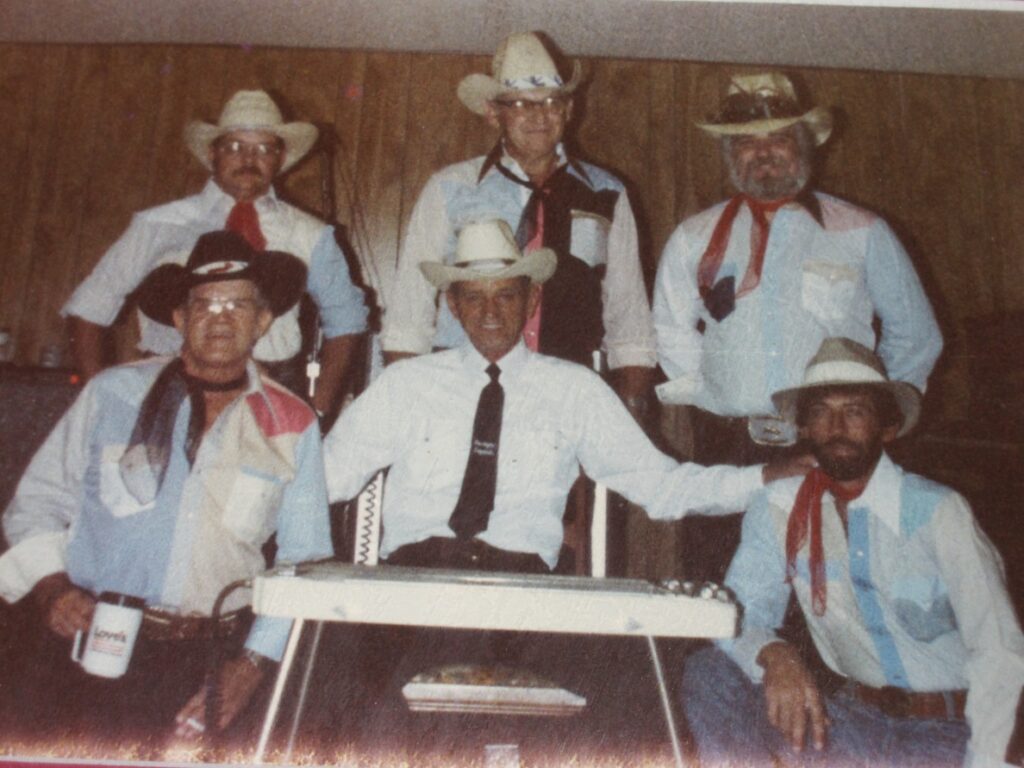
In a letter, she informed him she met another, and “very possibly she wrote to Erdice ‘her love for him had faded.’”
Devastated, he took the letter to Billy Jack. Billy Jack, a member of the Texas Playboys and brother to Bob Wills, told Erdice that this would be a good song.
Together, Billy Jack and Erdice wrote out a song. Billy Jack first recorded it and played it at the Red Barn Dance Hall. Bob Wills wanted to ply it at a faster speed, but both Billy Jack and Erdice insisted it needed to be “one of those slow belly rubbing songs.” Thus, the famous song “Faded Love” was born.
“Faded Love” became popular and many artists had their own recordings of the song, including Jackie DeShannon, Harry James, Dottie West, Conway Twitty, Elvis Presley, Ray Price & Willie Nelson with Crystal Gayle*, and Patsy Cline.
*Note: the duet version featuring Gayle reached number 3 on the Billboard Hot Country Singles in October 1980.
“It wasn’t until after Patsy Cline passed away that Erdice gained rights to the song, although it is unclear of the full details, but he received enough to purchase his parents a motel in Clayton, OK.”
Erdice kept playing the steel guitar later in life. He also played on the Red Foley Show. Vera Jane Burnett Cannon Amend, of Buffalo Valley, OK, married Erdice in their later years of life, near the age of 70 years old. “Vera’s house burned down a few years ago, and she lost most everything, including phots, documents, videos, tapes. Fortunately, his guitar was not at home when the house burned.” Erdice passed away in 2011, and Vera in 2023.
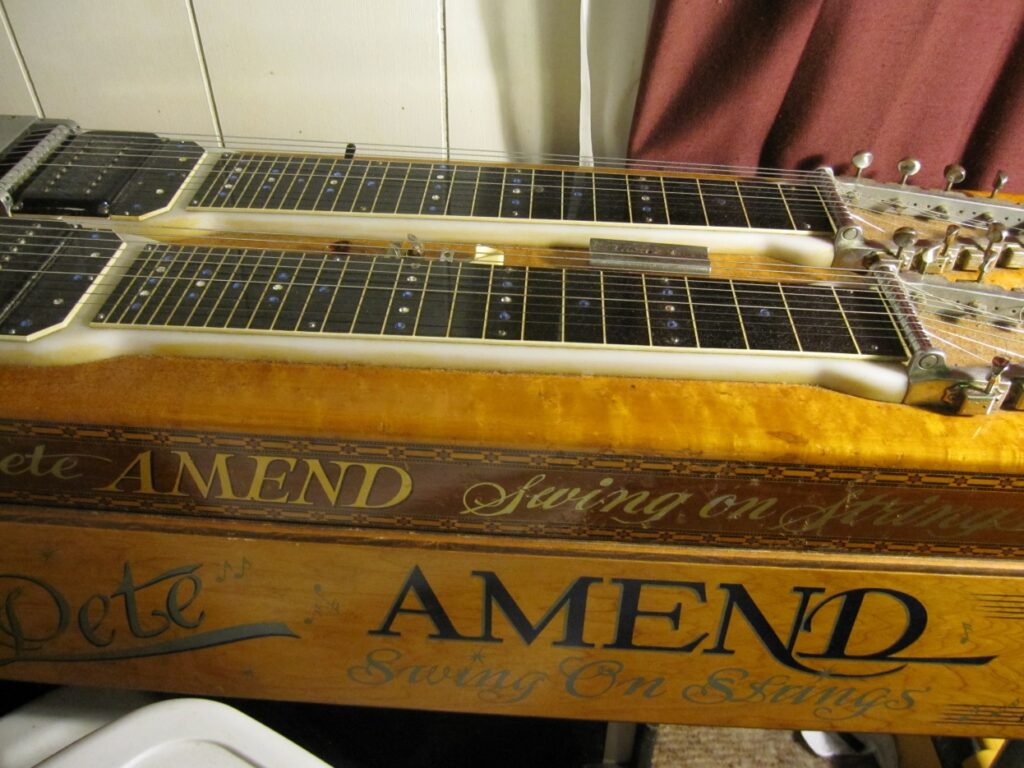
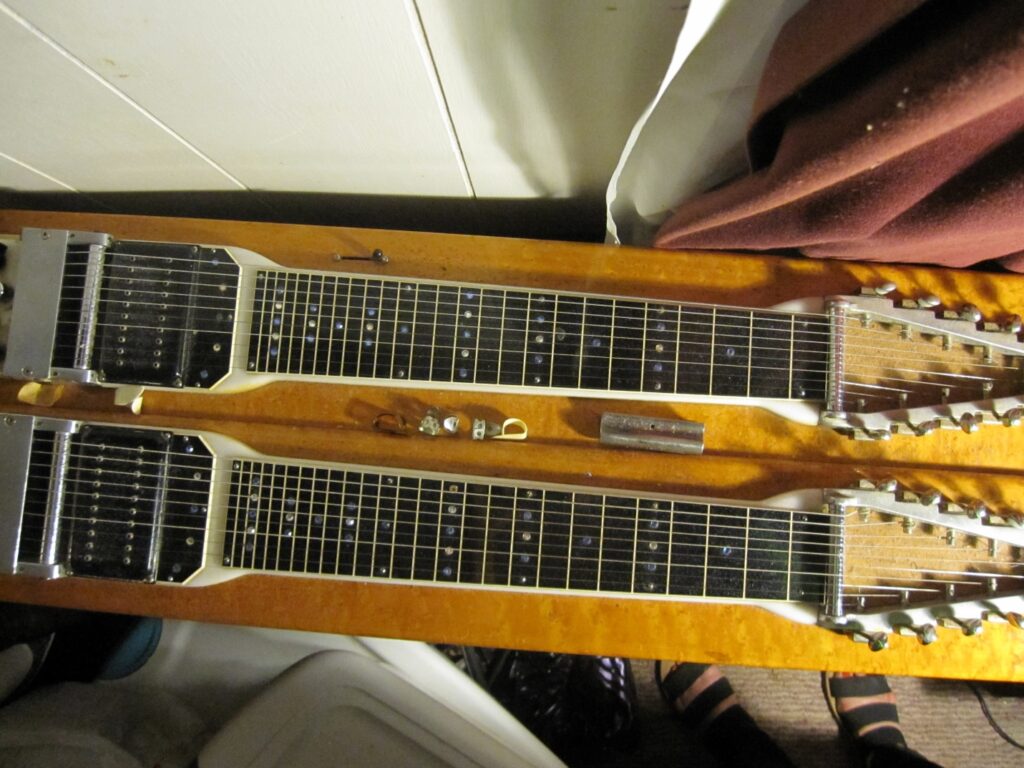
The 1940s and 1950s was full, busy, and exciting time for the band members. “When rhythm-and-blues, rock ‘n’ roll, and country-and-western music were popular, Bob had successfully transitioned from his big band. In the early ‘60s, he moved to Las vegas, where he initially appeared at the Show Board and then the Golden Nugget.” Later, Bob and Betty moved back to Fort Worth. Bob Wills kept performing at local venues.
“An era in American history ended with Bob’s passing on May 13, 1975, after a seven-year illness. Those who knew him were not prepared to see his legacy die.”
In 1985, the Bob Wills Museum opened. Betty Anderson Wills, Wills’ widow, opened the museum on the first day of Pioneer Days, a Fort Worth celebration at the city’s stockyards.
After Bob’s passing, Betty would remarry twice before her own death, to Jim Sheets and Verb Voss. Betty Lou Anderson Wills Sheets Voss died on March 14, 1993.
“Bob was inducted into the Country Music Hall of Fame in 1968, Nashville Songwriters Hall of Fame in 1970, Western Swing Hall of Fame in 1988, Rock and Roll Hall of Fame in the Early Influence category with the Texas Playboys in 1999, Texas Music Hall of Fame in 2000 and Oklahoma’s Music and Jazz Halls of Fame; and was honored by the Recording Academy’s National Trustees with a Grammy Lifetime Achievement Award in 2007. In 2021, Wills was inducted into the Texas Cowboy Hall of Fame. The annual Bob Wills Day in Turkey, Texas is celebrated on the last Saturday in April. The Bob Wills Birthday Celebration is held every year in March at the Cain’s Ballroom in Tulsa, OK, with a Western swing concert and dance.”
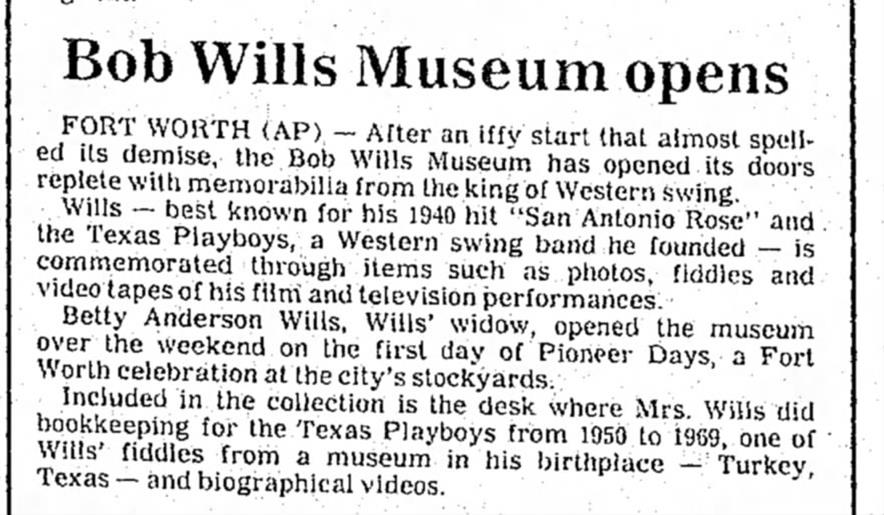
(Sapulpa Herald, May 5, 1934, February 25, 1935, November 22, 1935, April 29, 1937, December 23, 1939, November 27 1940, November 29, 1940, November 15, 1941, February 7, 1942, December 16, 1942, December 17, 1942, January 28, 1943, April 21, 1945; Sapulpa Daily Herald, May 15, 1975, February 15, 1976, April 29, 1985, March 16, 1993; Galveston Daily News, September 30, 1985; Bob Wills Museum; Wikipedia; Spotify; Vera Jane Burnett Cannon Amend Interview)





